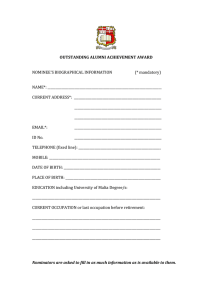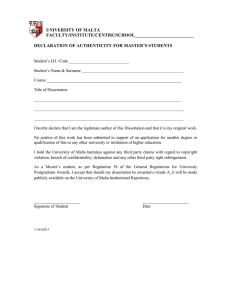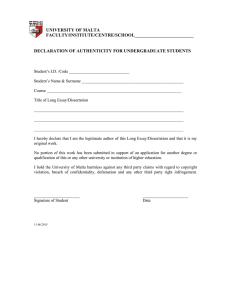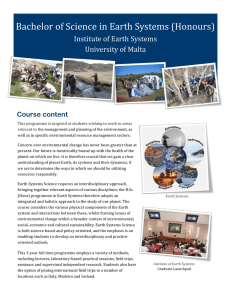Graduation Ceremony 5 Monday 24th November 2014 at 4.30 p.m.
advertisement
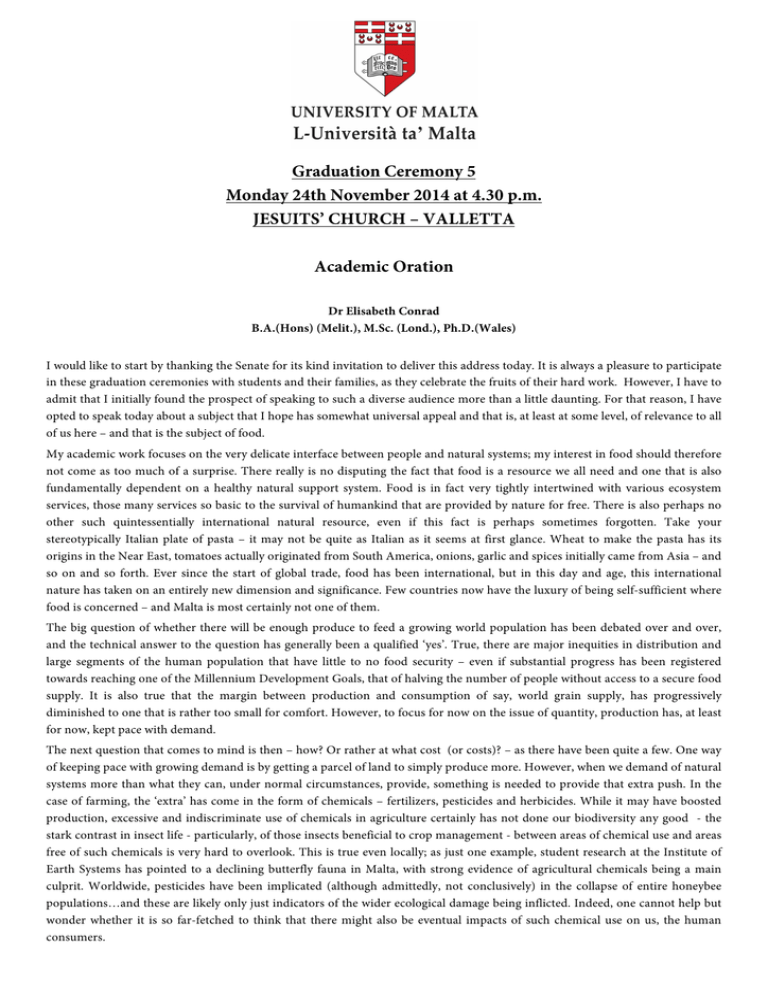
Graduation Ceremony 5 Monday 24th November 2014 at 4.30 p.m. JESUITS’ CHURCH – VALLETTA Academic Oration Dr Elisabeth Conrad B.A.(Hons) (Melit.), M.Sc. (Lond.), Ph.D.(Wales) I would like to start by thanking the Senate for its kind invitation to deliver this address today. It is always a pleasure to participate in these graduation ceremonies with students and their families, as they celebrate the fruits of their hard work. However, I have to admit that I initially found the prospect of speaking to such a diverse audience more than a little daunting. For that reason, I have opted to speak today about a subject that I hope has somewhat universal appeal and that is, at least at some level, of relevance to all of us here – and that is the subject of food. My academic work focuses on the very delicate interface between people and natural systems; my interest in food should therefore not come as too much of a surprise. There really is no disputing the fact that food is a resource we all need and one that is also fundamentally dependent on a healthy natural support system. Food is in fact very tightly intertwined with various ecosystem services, those many services so basic to the survival of humankind that are provided by nature for free. There is also perhaps no other such quintessentially international natural resource, even if this fact is perhaps sometimes forgotten. Take your stereotypically Italian plate of pasta – it may not be quite as Italian as it seems at first glance. Wheat to make the pasta has its origins in the Near East, tomatoes actually originated from South America, onions, garlic and spices initially came from Asia – and so on and so forth. Ever since the start of global trade, food has been international, but in this day and age, this international nature has taken on an entirely new dimension and significance. Few countries now have the luxury of being self-sufficient where food is concerned – and Malta is most certainly not one of them. The big question of whether there will be enough produce to feed a growing world population has been debated over and over, and the technical answer to the question has generally been a qualified ‘yes’. True, there are major inequities in distribution and large segments of the human population that have little to no food security – even if substantial progress has been registered towards reaching one of the Millennium Development Goals, that of halving the number of people without access to a secure food supply. It is also true that the margin between production and consumption of say, world grain supply, has progressively diminished to one that is rather too small for comfort. However, to focus for now on the issue of quantity, production has, at least for now, kept pace with demand. The next question that comes to mind is then – how? Or rather at what cost (or costs)? – as there have been quite a few. One way of keeping pace with growing demand is by getting a parcel of land to simply produce more. However, when we demand of natural systems more than what they can, under normal circumstances, provide, something is needed to provide that extra push. In the case of farming, the ‘extra’ has come in the form of chemicals – fertilizers, pesticides and herbicides. While it may have boosted production, excessive and indiscriminate use of chemicals in agriculture certainly has not done our biodiversity any good - the stark contrast in insect life - particularly, of those insects beneficial to crop management - between areas of chemical use and areas free of such chemicals is very hard to overlook. This is true even locally; as just one example, student research at the Institute of Earth Systems has pointed to a declining butterfly fauna in Malta, with strong evidence of agricultural chemicals being a main culprit. Worldwide, pesticides have been implicated (although admittedly, not conclusively) in the collapse of entire honeybee populations…and these are likely only just indicators of the wider ecological damage being inflicted. Indeed, one cannot help but wonder whether it is so far-fetched to think that there might also be eventual impacts of such chemical use on us, the human consumers. Food issues cannot be readily separated from land issues. Even in Malta, agriculture is the largest land user, but agriculture locally is certainly not characteristic of the large, industrial farms that are found in much of the rest of the western world. Indeed, perhaps the best descriptor of modern agriculture would be ‘big’ – multinational enterprises managing vast estates of land, producing large yields through intensive monocultures, and incidentally, in the process using up copious amounts of fossil fuels. A recent European agricultural census found that a small number of very large farms - less than 3% of all holdings - were responsible for more than half the farmland in the EU. The trend in European agriculture can indeed be summed up as a lot less farmers farming a lot more land. Some argue that this is a good thing, bringing with it economies of scale. Many disagree, on grounds of both social justice and ecological health. Smaller farms tend to make a much more tangible contribution to both natural and social capital, providing employment and safeguarding cultural and natural diversity. The latter considerations are unfortunately often rapidly left by the wayside in larger operations. Thankfully, the role of the small farmer is still appreciated here in Malta. The land issues of modern agriculture do not stop there. Another means of boosting production is, after all, simply that of appropriating more land for farming. The problem there is two-fold. First, we have already taken over most land areas worldwide that are conducive to farming – what is left is generally too steep, too dry, too wet, or too remote, with generally poor soils. Second, any further expansion to agricultural land will likely come at direct cost to the few remaining natural areas on the planet. Habitat loss is already widely acknowledged to be the single most important contributor to declines in biodiversity and the idea that the only way to ‘feed the world’ is to cause even more loss of biodiversity seems like a bit of a double bind. We have the same sort of double bind when it comes to water – the world’s largest user of water is the agricultural sector, particularly since the only way to grow water-intensive crops in drier parts of the world is to irrigate. Imprudent use of irrigation, though, is no more than a ticking time bomb. The Kingdom of Saudi Arabia, for example, has gone from impressive ‘greening the desert’ irrigation schemes to a production crisis that has seen it become almost entirely dependent on food imports – and that in turn opens up a whole other geopolitical arena of ‘land grabs’, i.e. appropriating land in other countries for growing food. While it seems unlikely Malta will go down that route anytime soon, the dangers of overexploiting water in Malta really should not need to be pointed out, and there is already ample evidence that water use in agriculture locally is very far from what could ever be considered to be sustainable. From a systems perspective, what we seem to be looking at is a situation that is perilously close to ‘system overload’ across world food supply – overfishing, overgrazing, overharvesting – simply put, overexploitation. This is when it becomes worthwhile remembering that, even with the world’s best technology, the base of food production remains ecology and impacts on ecology do not generally ‘go away’ if ignored for long enough – rather, they build up towards critical thresholds, when systems can no longer be maintained as they are. The lessons of these critical thresholds are there to be learnt from history, but regrettably do not seem to have been learnt adequately. In the 1930s, for example, a large stretch of the American mid-West experienced ‘Dust Bowls’ severe dust storms across over-exploited farming land – that did not only ruin agricultural production for decades but also fundamentally shaped the future of an entire generation. Today, we have similar ‘Dust Bowls’ taking shape in at least two parts of the world – northern China and Mongolia, and sub-Saharan Africa. On a wider scale, some scientists estimate that over a third of the world’s cropland is losing soil faster than it can be replaced. Again, the relevance of such soil degradation issues to a semi-arid country like Malta should be self-evident but the issue is often only vaguely discussed and for the most part, conveniently ignored. We talk about desertification as if it were a phenomenon affecting places far away, with the word conjuring up images of solitary camel trains or shifting dunes. Desertification is actually a far from exotic reality and one that is much closer to home than we care to think. It is not about spreading sands but a much more sinister process of soils losing their capacity to sustain production. The significance of all of this is really highlighted in a somewhat recent scientific concept of ‘planetary boundaries’. In 2009, a group of 28 internationally renowned scientists identified nine planetary boundaries – staying within these boundaries means that humanity can continue to develop and thrive for generations to come. At least five of these boundaries are directly linked to food production – the dispersion of chemicals, biodiversity, freshwater consumption, nutrient inputs to the biosphere and oceans, and land system change. The resilience of social-ecological systems that push the limits of these planetary boundaries has to be in some doubt. I hope that this discussion of food also shows why a systems approach – as adopted at the Institute of Earth Systems – becomes so critical. In our subject area, much of what we look at cannot be readily pigeonholed into a single disciplinary box. On the contrary, it becomes fundamentally necessary to look at the big picture, at the many different aspects of a topic – from the most fundamental science to the ever-changing playing field of world politics – to come anywhere close to a fair understanding of the dynamics of a particular natural resource. Of course, I cannot conclude this address without extending my warm congratulations to all students graduating today – it really is not all that long ago that I was on that side of these ceremonies, and for that reason I feel ill qualified to deliver the words of wisdom that are customarily offered up on such occasions. If you will allow me just one brief digression though, I will say this – I have had the privilege of meeting several extraordinary students over the past years, many whom I am sure will go very far. The students that stand out in my mind are not necessarily those who obtained the best grades but those that brought passion and enthusiasm to their studies – those who would never have been satisfied with a bare pass, knowing that they could do better, and those whose engagement in university life certainly did not stop at attending the occasional lecture. Wherever your paths may take you next, I augur that you deliver whatever projects you embark on with tha sort of enthusiasm and with a genuine desire to keep learning. Good luck and once again, my congratulations.
